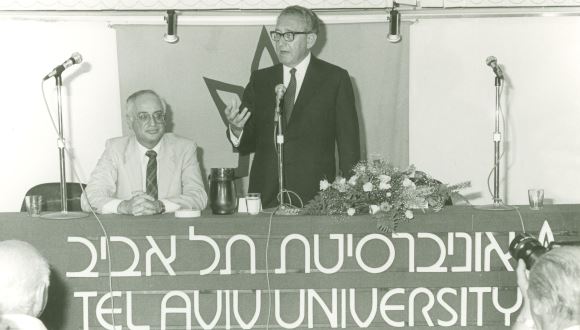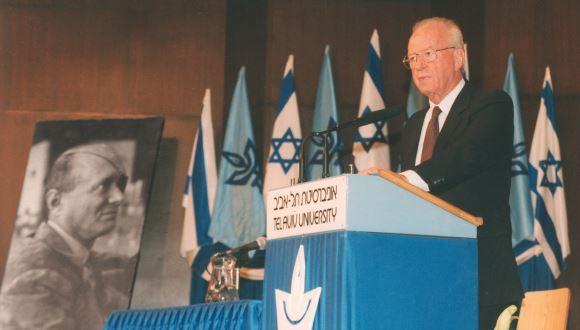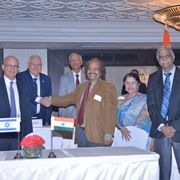Moshe Dayan Center Marks Its Jubilee
What do Henry Kissinger, Condoleezza Rice and Yitzhak Rabin have in common? They, along with dozens of other world statesmen and leaders, regularly appeared at Tel Aviv University’s Moshe Dayan Center across the decades.
This month, the Moshe Dayan Center for Middle Eastern and African Studies celebrated 50 years of research activity and influence. The occasion was marked at a conference attended by former directors of the Center and current director Prof. Uzi Rabi, who shared insights on the Center’s work against the backdrop of a rapidly changing Middle East.
Founded in 1966, the Dayan Center’s mission is five-fold: to serve Israeli and international practitioners, policymakers and scholars by providing accurate and timely analysis of the contemporary Middle East and Africa; to contribute to public and scholarly discourse surrounding regional issues of critical importance to Israel; to forge partnerships with leading international thought leaders; to seek peace through understanding between Israel and its neighbors; and to act as an incubator of excellence for future generations of scholars.
Today, the Dayan Center pursues its mission along a number of complementary tracks. It releases papers on regional developments on a monthly and bi-monthly basis, and publishes numerous books and monographs annually.
The Center hosts a varied program of lectures, conferences and other activities, and provides essential support and mentoring to affiliated researchers wishing to publish in leading academic journals and presses. Internship and visiting scholar programs offer students and scholars from around the world an opportunity to study and conduct research at TAU.
Informing policymakers
Dayan Center experts are frequently asked to give private briefings to the policymaking community, including the Israeli defense establishment, Knesset committees, the Foreign Ministry, members of foreign diplomatic missions, and international public forums. These scholars include Prof. Ofra Bengio, head of the Kurdish Studies Program and one of the world's leading experts on the Kurdish issue today; Dr. Hay Eytan Cohen Yanarocak, who has become a regular fixture in the Israeli media for his commentary on contemporary Turkish politics; Center Director Prof. Uzi Rabi, who similarly appears on a weekly basis in a variety of Israeli media outlets speaking on regional developments, and many other Center researchers.

Henry Kissinger with then TAU President Haim Ben-Shahar at a Dayan Center event in 1994
Members of the Dayan Center have held key diplomatic posts, including former Director Prof. Itamar Rabinovich who served as Israeli Ambassador to the United States, and Prof. Shimon Shamir, Co-Chair of the Center’s Egypt Forum, who served as Israel Ambassador to both Egypt and Jordan.
The Dayan Center runs a number of innovative research programs, among them the Doron Halpern Middle East Network Analysis Desk, which analyzes – both qualitatively and quantitatively – social network activity among Arab, Persian, and Turkish users. This enables researchers to reach a depth of analysis not easily found elsewhere.
Center scholars frequently lecture at the English-language International MA Program in Middle Eastern Studies, run by TAU International, the University’s overseas school. The Center also invites students enrolled in the program to gain practical experience at an active research center.
World’s largest Arabic press archives
The Moshe Dayan Center is home to one-of-a-kind resources. Its Arabic Press Archives hold more than one thousand reels of microfilmed newspapers, the earliest of which appeared in 1887. The collection comprises some 10,000 individual titles of newspapers, magazines, and periodicals in Arabic, Turkish, Persian, English, French and other regional languages, such as Tamazight (Berber).
The Center’s library houses an extensive collection of journals, articles, books, interviews, and other reference material that are of great value to students and researchers alike.
The Dayan Center was founded as the Reuven Shiloah Research Center in 1959, and was initially a non-profit association located within the Israeli Directorate of Military Intelligence and under the sponsorship of the Israeli Oriental Society. Led by Yitzhak Oron, the objective of the Shiloah Center was to conduct research on contemporary regional issues to which the intelligence apparatus was not able to devote adequate time, and to fill a gap in the Israeli academic discourse. Upon its incorporation into Tel Aviv University in 1966, the Shiloah Center was dissolved and its scholars and collections became part of the newly founded Shiloah Institute. Prof. Shimon Shamir, formerly a faculty member at Hebrew University, transferred to TAU to become the Center’s first director. In 1983, following the passing of Moshe Dayan, the Center acquired its current name.
The important work of the Moshe Dayan Center is independently funded from the generous contributions of individuals and institutions from around the world. The Center looks forward to another half-century of service to Israel and the field of Modern Middle Eastern Studies.






